
A BLADE SPECIAL REPORT
Inquiry sheds light on Chinese investors
Little previously known of pair who acquired city assets
2/19/2012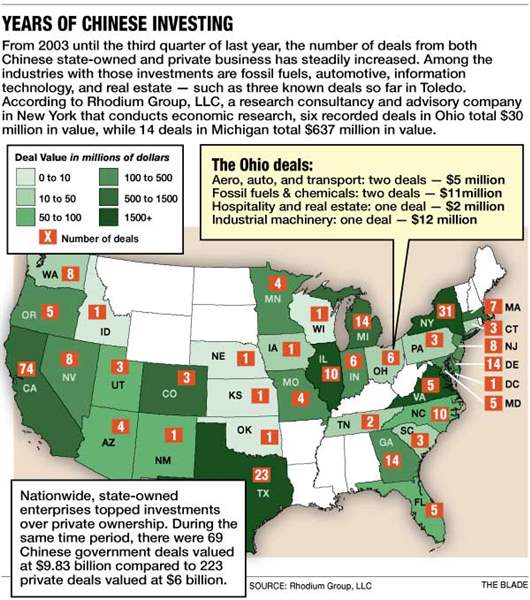
The Blade
Buy This Image
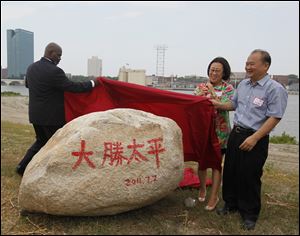
Mayor Mike Bell, Yuan Xiaohong, and Wu Kin Hung unveil a symbolic rock at a July, 2011, event marking the Chinese investors’ purchase of 69 acres of Marina District land in East Toledo. The rock, adorned with the Chinese characters for their company, Dashing Pacific, symbolizes steadiness, Mr. Wu said through a translator.
Toledo Mayor Mike Bell said more than a year ago that he knew little about the two Chinese investors he's entrusted to develop the city's long-envisioned Marina District.
While he dined with them, attended the wedding of one of their children, and traveled China with them, he did not order his staff to investigate them in the same way former Toledo mayors have scrutinized other potential developers of the Marina District -- the riverfront property city leaders have for more than a decade touted as their biggest economic development effort and the project that would infuse new life into downtown and East Toledo.
A MESSAGE FROM THE PUBLISHER AND EDITOR IN CHIEF
Mr. Bell has said repeatedly he didn't care how the two Chinese investors made their apparent fortunes, allowing them to close a $2.15 million cash deal on March 18, 2011, on The Docks restaurant complex. Soon afterward, half of the Marina District property was sold to the investors for $3.8 million, with their promises of building a $200 million mixed-use development along the downtown riverfront.
To Mayor Bell, facing a multimillion-dollar city budget deficit last year and trying to prevent police and fire layoffs, the cash from the Chinese investors came at the perfect time. Money is money, and the investors had it to spend.
READ MORE: Toledo's China Connection
"My vision is to make Toledo a true international city," Mr. Bell said. "Right now we have an Italian-owned Chrysler that is doing very well for us, yet if we can establish other international businesses inside the city of Toledo through the openness of what we are doing here with the delegations from China, I think it can be successful for Toledo. What I am trying to do is find people who have the capital to be able to invest that don't really need to go to a bank to be able to do it, to be able to help our city."
With the mayor deciding to sell some of Toledo's most important real estate and the city's most valuable assets without researching the backgrounds of the buyers, The Blade decided to take on that task, hiring an investigative firm with offices in China to provide background information on Wu Kin Hung, 55, and Yuan Xiaohong, age unknown -- the two behind Dashing Pacific Group Ltd.

The investigative firm -- which the newspaper has agreed not to name because of concern about possible reprisals against its owners and employees by the Chinese government -- uncovered a long and successful history of business development by the two investors in China. This success appeared to have been garnered within a system that does not align with American norms and business practices.
Mr. Wu and Ms. Yuan were the first foreign investors Mayor Bell enticed to Toledo. That started a flood of other potential Chinese investors to the city -- about 100 people in 30 delegations within the last year, according to Mr. Bell.
From the beginning of his effort to find deep-pocketed foreign investors, the mayor said he didn't know much about Ms. Yuan or Mr. Wu, and that was fine with him.
"The question is, 'Are we scrutinizing our Chinese investors in a manner different than our own regular business people?'" Mayor Bell said in an interview with The Blade. "The idea of scrutinizing these people any differently than we have scrutinized anyone else, I think that would be unfair."
Ms. Yuan and Mr. Wu agreed to be interviewed by telephone for this story, but at the last minute Mr. Wu backed out, saying he was traveling for business.
He later issued a statement, saying: "We have found the city of Toledo to be a friendly, peaceful, and beautiful place, and we want to do something positive in this community … We have complied with all laws and business standards in China and have worked diligently for many years to earn the respect of our business partners there."
During the interview, conducted with translators in Toledo and China, Ms. Yuan declined to answer in-depth questions about her business in China or the origins of her partnership with Mr. Wu, but she did want to talk about her investment in Toledo.
"It has been half a year since we purchased the land by the marina last June," Ms. Yuan said. "We wanted very much to report to everyone the progress of the land by the river."
'Private' figures

Last year, when the first real-estate deal between the Chinese investors and the city was announced, Mayor Bell refused to release the Chinese investors' names, saying they wanted to remain "private."
It wasn't until Dashing Pacific completed its $2.15 million purchase of The Docks restaurant complex on the Maumee River from the city that city officials released brief biographies of Ms. Yuan and Mr. Wu -- giving minimal details such as their birthplaces, education, and a list of some of their past projects and jobs in China.
Then came the sale of 69 acres of the city's Marina District to Dashing Pacific for $3.8 million.
The city spent about $43 million of mostly state and federal money over more than a decade to decontaminate and prepare the land for development. The history of the Marina District stretches back to about 1997, when the city started assembling the land from private hands.
The total area is 125 acres between Front Street and the river and includes the decommissioned Toledo Edison Acme power plant just to the north of the 69 acres Dashing Pacific bought. The Chinese company has an option to purchase the former power plant.
Mr. Bell said the Chinese investors promised to spend $200 million to develop the riverfront land into a residential and commercial complex.
The investigative firm in China found that the two investors made their millions working under China's common system of patronage that is heavily reliant on family relations, personal connections, and favors. Both, it appears, have connections with officials in the ruling Chinese Communist Party.
The report stated that Ms. Yuan's success stems from her operation of an information technology firm in Inner Mongolia -- the area of China where she was born.
Investigators found Chinese incorporation records that confirm Ms. Yuan as the legal representative of the Inner Mongolia subsidiary of Guangdong Information Engineering Co. Ltd., based in Hohhot, the capital of Inner Mongolia.
"[Ms.] Yuan has used her government connections to win contracts" for that company, the report states. "The company records were partial and fragmented … and one document in the company records, which should have included detailed personal information on Ms. Yuan, showed signs of redacting."
Ms. Yuan did not disclose to Toledo officials that her background is in information technology and not in real estate development.
In her interview with The Blade, Ms. Yuan confirmed her role with the company, saying, "I am in charge of their Inner Mongolian office."
She did not want to answer questions about ties to Chinese Communist government officials and directly answered "no" when asked if she is a member of the Chinese Communist Party.
Wu's fortune

Investigators hired by The Blade were able to detail a much more extensive background on Mr. Wu, finding that he amassed a personal fortune through his position as a government bureaucrat in the land development and planning agency in Shenzhen, a city near Hong Kong which grew over the past 30 years from a small rural coastal area of 20,000 people to a megacity of 17 million today, bigger than New York City and Los Angeles and growing.
The investigators found that Mr. Wu started working for the Shenzhen Construction Commission in 1980 and that he was assigned to a subdepartment called the Shenzhen Property Development Corp. at the time when it had a monopolistic position as the city's only authorized real estate development agency.
Because of the lack of Chinese records and lack of governmental transparency, it is unclear how much money Mr. Wu made while working for the local government, but investigators estimate it was sizable.
"Our sources report that … Wu made massive profits from his job at the SCC," the report stated. "The sheer scale of profits accessible would have been unprecedented in China at the time, since Shenzhen was the first place in China where trading in real estate became legal."
For example, the investigators found: "Between 1987 and 1988 alone, the Shenzhen government leased land worth 122 million [Chinese Yuan Renminbi], or U.S. $19.3 million at today's values. Wu would have made certainly millions, if not tens of millions of dollars, throughout his tenure at the SPDC in the 1980s."
Investigators found that Mr. Wu's government salary would have been "paltry," but his real wealth was generated by various payments he would have received from land developers and contractors seeking government permission to build in Shenzhen.
Experts interviewed by The Blade confirm that Chinese business during the development of Shenzhen was fast-paced and falls in line with the findings of the investigators. But there were downsides to Shenzhen's development as it grew.
Change in China
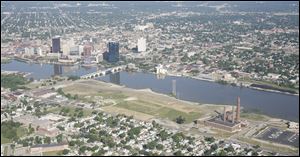
The Chinese investors closed a $2.15 million cash deal on The Docks, left, in March, 2011, and later paid $3.8 million for Marina District land.
Ezra F. Vogel, a retired Harvard University professor and author of Deng Xiaoping and the Transformation of China, said the explosion of construction and commerce in Shenzhen -- as it was transformed from a fishing village into a major city in just a few decades -- left some villagers displaced.
"Some farmers or their children became workers in the factories. Some collected continuing payments for the use of their land. Some became well-to-do," Mr. Vogel said. "Many agreements about land use involved many different people; if a developer used land for development, people were displaced, but sometimes it was different agents who did the moving."
Chinese politician and diplomat Deng Xiaoping, who was leader of the Chinese Communist Party from 1978 to 1992, is credited with reshaping China and lifting hundreds of millions of people out of poverty. Shenzhen was a focal point in that transformation, and Mr. Wu was at the nexus of that evolution.
Derek Scissors, an expert on China and an Asian scholar at the Heritage Foundation in Washington, said the people living in Shenzhen were happy for progress.
"After the Cultural Revolution, China is poorer than Bangladesh, and Deng Xiaoping says, 'We have to do something or we will die,' " Mr. Scissors said. "Shenzhen was nothing. China was dirt poor and Shenzhen was another dirt-poor place, but once the Chinese got going and learned how to do things and develop, they learned very quickly."
He said the old rural lifestyle of subsistence fishing and farming was happily shed to make way for development -- at least at first.
"At the beginning, there was lots of unused land and no one owned land back then; it wasn't allowed," Mr. Scissors said. "Then they started to throw people off the land they had lived on. They didn't have rights to land or political rights -- they had no rights, but people there got much more prosperous."
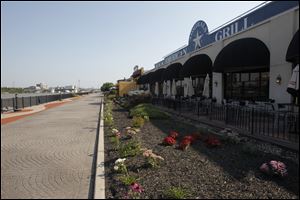
The back patio on the water at the Admiral's American Grill at The Dock's.
Now Shenzhen, the site of China's first special economic zone set up to allow capitalistic-style trade without the restrictions of China's old ways, has highways running along the Pearl River delta, and thousands of trucks loaded with goods pass through the city every day.
A third of all Chinese exports go through the cities of Shenzhen, Shanghai, and Suzhou even though they hold less than 3 percent of the country's population.
Per capita, Shenzhen is China's No. 1 export point because it is smaller, with only 17 million people.
"Everything goes through Shenzhen," Mr. Scissors said. "By itself, it has something like 10 percent of all Chinese exports because of the size of its port, so when they say 150 of the biggest companies have offices there, that is true."
Mr. Wu was at the heart of that development as he climbed the ladder at the government land use agency in Shenzhen -- the Shenzhen Property Development Corp. After he left the agency to form a private company, he was involved in building one of the city's most iconic skyscrapers -- the Empire Building, a 69-story, green glass tower in the heart of the city.
Rise in wealth
Statistics show that the majority of Chinese investment -- deals that tend to range in the billions of dollars -- are done by state firms. Other investments, such as those on the scale of the Toledo land deals, usually involve private investors.
"There are millions of these Chinese investors out there right now," Mr. Scissors added. "The richest 10 percent of Chinese is 130 million people plopping around the globe, and there are astonishing figures about the wealth held in the hands of family [members] of Communist Party members -- and there are 80 million Communist Party members."

Gov. John Kasich, left, met in March with two figures involved in helping Mayor Bell make connections in China: Scott Prephan, center, and Simon Guo, second from right. Investor Yuan Xiaohong is at right.
He said cultural differences require patience.
"The number one thing to do is wait. Don't rush," he advises. "You are asking for trouble. They don't move that fast; they don't understand local regulations."
The rise of wealth in China mirrors the decline of the manufacturing base in the United States.
Many of the high-paying American factory jobs that were lost over the past two decades were replaced by low-paying factory jobs in Chinese cities such as Shenzhen -- some as low as $200 a month with 60-hour work weeks.
The goods those low-paid Chinese workers produce are shipped to the United States and other First-World countries, making China the world's largest exporter of goods and leaving the Chinese flush with cash.
The Chinese government now owns $1 trillion in U.S. Treasury bills, and Chinese investors such as Mr. Wu and Ms. Yuan are investing some of the money they've accumulated in places like Toledo.
Mr. Scissors distinguishes between large-scale Chinese government deals and small investments such as those so far in Toledo.
"There are big moral issues about dealing with state-controlled investments such as the repression of religious freedoms, treatment of dissidents, political persecution, and those are well-documented in the public domain," Mr. Scissors said. "The Toledo-sized [investments] look to be genuinely private, and the risk there is they are just looking for a place to park their money, so while you will get the cash, they don't do anything after."
'Positive' signs
That will not be the case with Dashing Pacific, according to its local partners. Bill Rudolph, chairman of the Rudolph/Libbe Cos., said Dashing Pacific has hired a marketing firm from Vancouver to work on the Marina District.
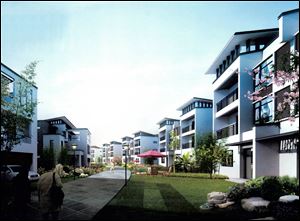
Conceptual drawings released early last year by Dashing Pacific offered one possible vision of a mixed-use development at the Marina District.
"They have funded the planning efforts for a market study-strategy firm called MXD Development Strategies," Mr. Rudolph said. "They are specialists in doing market studies for mixed-used developments, and their work is 50 percent complete at this time."
He also pointed out that Jimmy Wu, the son of Mr. Wu, moved from New York and purchased a home in Perrysburg.
"That is another positive indication," Mr. Rudolph said. "He is out and about in the community, and he is assisting in the meeting of other [Chinese] delegations."
Mayor Bell also said the city is protected by the terms of the purchase agreement with Dashing Pacific. The contract allows the city to buy back the Marina District land if it is not developed to the city's expectations within five years. The buyback price would be the same $55,000 an acre the city sold it for.
Lack of scrutiny
A lot less is known about Ms. Yuan than Mr. Wu, and investigators in China had trouble digging into her background. "We ran into some unexpected obstacles," wrote the owner of the firm that conducted the investigation.
Ms. Yuan told The Blade that she did not know why the firm would have had any trouble looking into her background.
Mayor Bell said Ms. Yuan and Mr. Wu don't deserve more scrutiny than any domestic investor. While he knows corruption exists in China, and that some deals elsewhere in the United States with Chinese investors have gone poorly for cities and businesses, he said the vast majority have not. He is not discouraged from wooing more Chinese businessmen to Toledo.

Dashing Pacific Group representative Jimmy Wu and Mayor Mike Bell speak at the Toledo Club in October, 2011. Mr. Wu, the son of investor Wu Kin Hung, has purchased a home in Perrysburg.
"You can't control the rest of the world, but you can control what happens here in the United States," Mr. Bell said. "I have not met a business person here that has come through these doors that is not prepared to abide by the rules that govern these United States when it comes to those types of practices, so I can't worry about what they are doing in some other place."
The mayor has offered little information about other Chinese investors coming through Toledo, refusing multiple times to provide the names of potential Chinese investors. He has, however, provided them with tours of his 22nd-floor office in One Government Center, dinners, and personal performances by members of the Toledo Symphony.
Mr. Bell's oft-stated view is that money from overseas investors, no matter who they are or what their backgrounds, is good for Toledo.
"We see the intent of what Dashing Pacific has been prepared to do, especially in the Marina District, is actually [an] economic development shot in the arm to being able to get people back to work," he said. "I have no reason not to believe that they will do what they say they are going to do and it will be a multiuse area."
In September, another Chinese investment group called Five Lakes Global Group Ltd. purchased Toledo's largest downtown hotel, the former Radisson Hotel, which had already been renamed the Park Inn. The sale price was $3 million -- a rock-bottom price for a hotel that in 1987 cost more than $42 million to build. Mr. Bell again refused to identify the investors who purchased the hotel. He said they would reveal their plans when they are ready.
Past developers
None of the previous developers for the Marina District under former mayors Carty Finkbeiner and Jack Ford was able to close on the property. But those developers -- Larry Dillin, Frank Kass, and the Pizzuti Cos. -- were all scrutinized by those two former mayors' administrations, submitted colorful site plans, and took public input from East Siders. Mr. Dillin, the most recent developer whose plans fell through, released plans in 2006 and again at the end of 2007, when he presented conceptual drawings that showed a veritable urban wonderland.
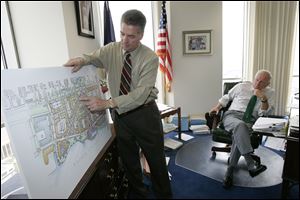
With Mayor Carty Finkbeiner looking on in his Government Center office in June, 2008, developer Larry Dillin goes over his plans for the Marina District.
In August, 2008, Toledo City Council did what it thought would set into motion construction of the Marina District under Mr. Dillin with approval of a $3.9 million state loan and a new agreement with the Perrysburg developer. Mr. Dillin had said a publicly funded roadway and waterfront park were going to be a catalyst for what eventually would be a $320 million private residential and commercial development.
He offered a personal guarantee to repay loans but told council he would walk away from the project if his personal financial information was made public.
To shield his personal information, the Finkbeiner administration arranged an independent review of Mr. Dillin's finances to ascertain if he was in fact able to make good on the promise.
Jen Sorgenfrei, Mayor Bell's spokesman, took umbrage with claims that Dashing Pacific was not checked out as well as people such as Mr. Dillin.
"I think we have done as much as necessary due diligence as the other developers who were promised development rights on that property the last 10 years, which never materialized," she said. "If that accountant who looked at [Mr. Dillin's] capacity to borrow and proceed gave the thumbs up, then why is Larry Dillin not today developing the Marina District?"
Mr. Finkbeiner said he first chose Mr. Kass and then Mr. Ford switched to Pizzuti Cos. when he took office, but there were "at least a half dozen" people and firms that offered ideas and plans before he selected Mr. Dillin.
"Every Friday morning for hours for four years I met with my people to look at how we were progressing … We put a lot of scrutiny on this." Mr. Finkbeiner said. "We didn't make a decision on Larry Dillin until we inspected him, roughly approximately six months after the Pizzuti thing was terminated, looking at financially who could undertake it."
Dashing Pacific
Dashing Pacific, the holding company Ms. Yuan and Mr. Wu formed to buy The Docks restaurant complex and the Marina District, is registered with the state of Ohio. Little else can be found about the firm in this country, other than that its registered agent is Toledo attorney David Squillante, according to the Ohio Secretary of State's Office in Columbus. Not much more can be found in Chinese records. Dashing Pacific is a holding company registered in Hong Kong and keeps an extremely low profile, according to the investigators hired by The Blade.
"We found no evidence of any commercial activity in Hong Kong or the People's Republic of China," the firm's report states. "It appears to be an investment vehicle primarily for the properties in Toledo."
Dashing Pacific was incorporated in January, 2011, with 60 percent of it owned by Mr. Wu and 40 percent by Ms. Yuan, although she is listed as the chairman of the firm on city of Toledo documents. She is also identified in records as "Yuen Siu Hung," an alternate, Cantonese spelling of her name.
The company is registered to the address of a "secretarial company" in the Kowloon neighborhood of Hong Kong. A Shenzhen address on a business card obtained by The Blade of a Dashing Pacific employee could not be located. According to the Shenzhen city authorities, there is no such office.
The official Chinese registration of Dashing Pacific shows its address is a location in Hong Kong.
At least one other company in the public domain is listed at that address, and two of Mr. Wu's other private companies are also listed at that same location.
Ben Carlos Thypin, director of market analysis at Real Capital Analytics Inc., a research firm with offices in New York, said it is not uncommon for Chinese investors such as Ms. Yuan and Mr. Wu to set up companies in third countries or in Hong Kong to facilitate investments inside the United States.
Under the United States EB-5 visa program, foreign investors can receive a permanent visa for themselves and each member of their family younger than 21. The relatively unknown but increasingly popular visa program is reserved for foreigners who invest at least $1 million in an American enterprise.
The program offers benefits such as allowing participants access to education at in-state tuition rates and the ability to live anywhere regardless of where the investment is made. As a high-unemployment area, East Toledo -- where the Docks and Marina District are located -- would qualify for the lower $500,000 investment threshold under the program for those seeking visas.
Ms. Yuan told The Blade that she has not thought about applying for U.S. citizenship.
"I am a Hong Kong citizen, so I can go abroad very easily so I don't have to apply for U.S. citizenship, and it will depend on my kids. My daughter's husband is currently a U.S. citizen," she said.
Ms. Yuan said she travels a lot between Hong Kong, the cities of Ordos and Hohhot in Inner Mongolia, and Shenzhen. In all, Ms. Yuan said, she owns 15 homes in China, including a beach house and some in the thick of Shenzhen's metropolis.
Edward Friedman, a professor emeritus of political science at University of Wisconsin-Madison and an expert on Chinese politics and U.S.-Asian relations, said Hong Kong citizens do have greater ease traveling abroad.
"According to the rules of the Hong Kong retrocession from Great Britain to China, it kept a lot of control over its own passport and visa policies," Mr. Friedman said. "It generally is accepted that Hong Kong residents, in applying for visas elsewhere, are treated pretty much as if they were still Bermuda or some other British colony that still exists."
Connecting
Mayor Bell met Mr. Wu and Ms. Yuan during his first trip to China in September, 2010. He was introduced to the pair by Simon Guo, a Chinese translator and deal broker, who was introduced to Mr. Bell by Perrysburg real estate salesman Scott Prephan. Mr. Prephan encouraged the mayor and top city officials to look to China for much-needed investment in the city.
Mr. Prephan, whose involvement in failed local real estate developments led him to form a company to help American firms relocate manufacturing operations to China, said he has been to China multiple times. His company never got any business, Mr. Prephan said last year, but it did lead him to Mr. Guo, who was eventually invited to visit Toledo to see what the city had to offer.
Mr. Guo was impressed with what he saw and urged Mayor Bell and Toledo business leaders to go to China to meet people interested in investing their new wealth in the United States.
The Perrysburg businessman seems to have found success in this venture by persuading Mayor Bell to sell city assets to Ms. Yuan and Mr. Wu. Mr. Prephan was paid a $107,500 commission for brokering the $2.15 million sale of The Docks, and he received an undisclosed commission for the sale of the Marina District. Both paydays, however, resulted in litigation, with creditors going to court in an unsuccessful attempt to seize the payments.
Mr. Prephan failed to return repeated emails and telephone calls seeking comment about Mr. Wu and Ms. Yuan.
Mr. Guo -- who according to the mayor has purchased a home in the Toledo area -- continues to bring Chinese investors to Toledo and offers them a view of the city's amenities. That usually includes a private performance by the Toledo Symphony, tours of the Toledo Museum of Art, and dinner with Mr. Bell.
At a Toledo Chamber of Commerce dinner in October at the Toledo Club, Mayor Bell said 30 groups of Chinese investors had visited the city by that time last year.
Mr. Bell, along with an entourage of city employees, area businessmen, and his family members, have made three trips to China.
Settling in?
Ms. Yuan's most recent trip to Toledo was three days in November, during which she announced that Dashing Pacific would pay to have the entire Toledo Symphony flown to China for performances in several cities. The gift will include round-trip airfare to China for about 80 musicians and flights in country to multiple Chinese cities. Ms. Yuan was flanked by Toledo Symphony cellist Amy Chang, a Taiwan native who became fast friends with Ms. Yuan.
Jimmy Wu, the investor's son, has become the spokesman for Dashing Pacific in Toledo. When he was married in May, 2011, during a lavish ceremony before hundreds of people at the five-star Grand Hyatt Shenzhen hotel in Shenzhen, Mayor Bell and his parents were guests, with the mayor speaking at the wedding about his new friendship with the Wu and Yuan families.
Jimmy Wu and his bride are expecting their first child.
"Perrysburg is a good place for family, which is why we picked it instead of New York," the younger Mr. Wu said before Ms. Yuan made the symphony announcement in November.
The younger Mr. Wu, 30, worked for the accounting firm Deloitte & Touche LLP in New York after attending college at Duke and Northwestern universities.
Even though Mr. Wu and Ms. Yuan are business partners, they are much closer.
When asked by a bystander at the symphony announcement whether Ms. Yuan was his mother, Jimmy Wu said no, "but she is like family," he responded.
Contact Ignazio Messina at: imessina@theblade.com or 419-724-6171.